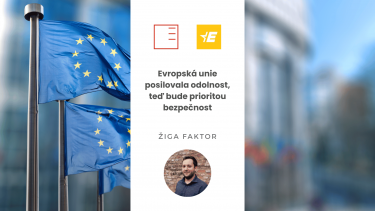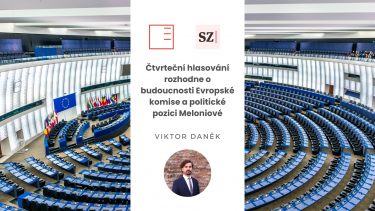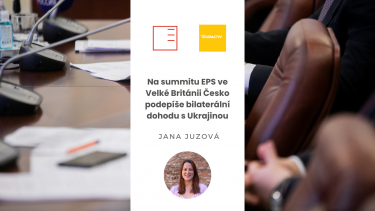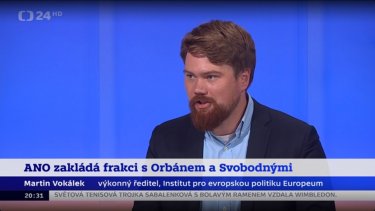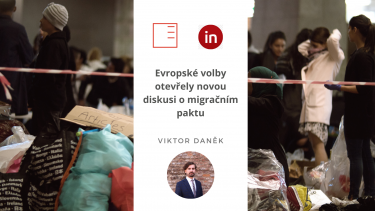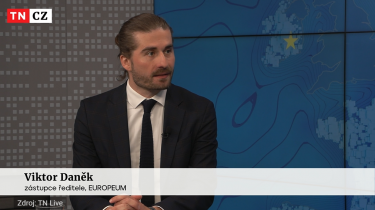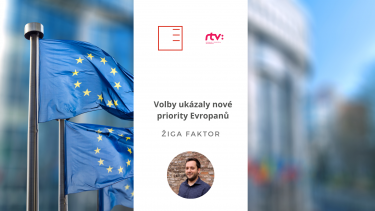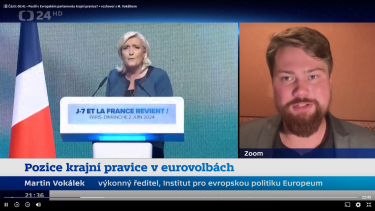Euractive | EU strengthened resilience, now security will be a priority
This year the Czech Republic celebrates twenty years of membership in the European Union. In the meantime, the EU has gone through turbulent years associated with a series of crises - from economic to migration to pandemic and security. However, the wealth of the Czechs has increased by more than 40 percent over the years and the standard of living has reached 90 percent of the European average. This is according to data presented by the Office of the Government of the Czech Republic on the occasion of the anniversary, while Czech exports grew by more than 320 percent thanks to EU membership. Žiga Faktor, head of EUROPEUM Institute's Brussels office, comments for Euractive on the other challenges the EU now faces.
Zjistit více
Novinky.cz | The number of migrants arriving in Europe has significantly decreased, with many heading to the Canary Islands
The European agency Frontex has released data on the number of migrants arriving in the European Union. This year, it recorded a third less migrants who have entered the Union illegally compared to last year. What are the reasons behind the decrease in migrant numbers? Did the failed agreement between the United Kingdom and Rwanda have an impact? Will the recently approved migration pact, which will come into effect in two years, also help? Viktor Daněk, Deputy Director of EUROPEUM Institute, commented on this for Novinky.cz.
Zjistit víceSeznam Zprávy | Thursday's vote will decide the future of the European Commission and Meloni's political position
Thursday's vote will determine whether the current head will continue to lead the European Commission. However, it will also be pivotal for Italian Prime Minister Meloni. She must either join the majority or risk ending up on the sidelines. Viktor Daněk, Deputy Director of EUROPEUM Institute, provided a comment on her goals for Seznam Zprávy.
Zjistit víceEuractiv.cz | At the EPC Summit in the UK, the Czech Republic will sign a bilateral agreement with Ukraine
The United Kingdom is preparing for a major summit of the European Political Community (EPC). After the Czech Republic, Moldova, and Spain, Britain is only the fourth hosting country. Among other topics, the states will discuss Ukraine and illegal migration. On a bilateral level, the Czech Republic will sign a security agreement with Ukraine. Jana Juzová, a researcher at EUROPEUM Institute, commented on the summit for Euractiv.cz.
Zjistit víceTA3 | Questions about the Hungarian Presidency
Make Europe Great Again is the motto of the Hungarian Presidency of the Council of the European Union. Hungary has set seven priorities, including fighting illegal migration and strengthening European defense. But the next six months raise many questions about the direction the Union will take under Budapest's leadership and what it will mean for Ukraine. Žiga Faktor, deputy director and head of the Brussels office of EUROPEUM Institute, explains the situation for Slovak TV TA3.
Zjistit více
ČT24 | ANO establishes a political alliance with Orbán and Austrian FPÖ
The Italian League, led by Matteo Salvini, will join new European Parliament party announced by the ANO movement, along with Viktor Orbán's Fidesz and the Freedom Party of Austria. They have identified the sovereignty of countries, the fight against illegal migration and the revision of the Green Deal as priorities. The alliance, called Patriots for Europe, now intends to invite other parties, and the group must be made up of MEPs from at least seven countries. Martin Vokálek, Executive Director of EUROPEUM Institute, comments for ČT24.
Zjistit více
Novinky.cz | The European elections have opened a new debate on the migration pact
After Filip Turek and Kateřina Konečná achieved significant success in the European Parliament elections in the Czech Republic, a debate has arisen about their stance on the migration pact. Turek aims to free himself from its constraints, while Konečná advocates for its complete abolition in its current form. But is this even feasible? Viktor Daněk, deputy director of EUROPEUM Institute, commented this topic for Novinky.cz.
Zjistit víceTN.cz | What do the results of the European elections indicate about the mood in Czech society?
How do the results of the European Parliament elections reflect the mood in society? Have predictions about the new composition of MEPs being predominantly right-wing been fulfilled? And what skills are essential for the success as a Member of the European Parliament? Viktor Daněk, Deputy Director of EUROPEUM Institute, comments in an interview for TN.cz.
Zjistit víceRTVS | Elections show Europeans' new priorities
After the European Parliament elections, the two largest factions retained their positions. However, far right parties has made gains at the expense of the Liberals and Greens. It was significant in France, Germany, Austria and other Member States. Why more and more young people vote for them? Will the right-wing groups in the EP join forces? And how can they influence migration policy, support for Ukraine or the Green Deal? For RTVS programme Z prvej ruky comments Žiga Faktor, deputy director and head of the EUROPEUM Institute's Brussels office.
Zjistit více
ČT24 | The position of the far right in the EU elections
Political analysts and pre-election polls predict a strengthening of the right or far right after the European Parliament elections in June. The success of the populists may be due to a change in priorities among younger voters. This group may feel overlooked and disadvantaged compared to older generations. Martin Vokálek, Executive Director of EUROPEUM Institute, commented on this issue.
Zjistit více
Staroměstské náměstí 4/1
Praha 1 - Staré Město
110 00
tel.: +420 212 246 552
email: europeum@europeum.org
https://www.europeum.org
